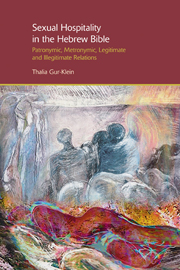 Sexual Hospitality in the Hebrew Bible
Sexual Hospitality in the Hebrew Bible Book contents
- Frontmatter
- Contents
- Acknowledgements
- Introduction
- 1 Patriarch hospitality and sexual hospitality
- 2 Marital and non-marital systems
- 3 Baal marriage of dominion
- 4 Metronymic marriage: remaining with kin – counter-patterns of baal marriage
- 5 Intersecting patterns and conflicting imperatives
- 6 Widow marriage, land and kin surrogacy
- Epilogue: moral imagination
- Notes
- Bibliography
- Index
1 - Patriarch hospitality and sexual hospitality
- Frontmatter
- Contents
- Acknowledgements
- Introduction
- 1 Patriarch hospitality and sexual hospitality
- 2 Marital and non-marital systems
- 3 Baal marriage of dominion
- 4 Metronymic marriage: remaining with kin – counter-patterns of baal marriage
- 5 Intersecting patterns and conflicting imperatives
- 6 Widow marriage, land and kin surrogacy
- Epilogue: moral imagination
- Notes
- Bibliography
- Index
Summary
In his modest book, Sex and Family in the Bible and the Middle East (1959), Raphael Patai offers a survey of customs and traditions regarding family values and sexuality in both ancient Middle East and biblical times. Relevant to my subject, Patai brings to the fore symbolic codes concerning patriarchal hospitality and sexual licence. The two codes seem to generate uncompromising imperatives; the rules that generate them, however, may infringe on one another.
Patai opens his discussion by presenting the conventional viewpoint that patriarchal hospitality was so highly regarded that it could override strict considerations of women's chastity. Obliged by hospitable codes, a host might sacrifice the chastity of his wife, concubine or unmarried (virginal) daughters to safeguard his guests' honour and protection. Initially, Patai presents Genesis 19 and Judges 19 to showcase that virgin daughters and a concubine might be offered to outsiders when the safety and honour of a male guest are at stake (Patai 1959: 139–45). This nodal point has been presented by many critics as the denominator of patriarchal praxis, encompassing the quintessential wrongs that male bonding and dominion inflict on women (Bach 1999a: 389–403; Bal 1993a; Jones-Warsaw 1993: 172–87).
However, Patai proposes an additional hypothesis suggesting that these stories may have survived residuals of cultural templates other than the conventionally patriarchal one. One such custom could refer to sexual hospitality. Patai proposes that while the host offers protection and provision to his guests, offering his daughters alludes to customs that oblige the host to provide sexual gratification to strangers and outsiders as part of a boundless hospitality. Patai surmises that offering women to outsiders reveals atavist customs that may coexist alongside or as part of patriarchal values of hospitality.
- Type
- Chapter
- Information
- Sexual Hospitality in the Hebrew BiblePatronymic, Metronymic, Legitimate and Illegitimate Relations, pp. 6 - 58Publisher: Acumen PublishingPrint publication year: 2013
